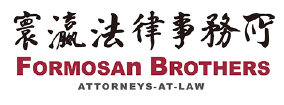Foreign companies establishing a subsidiary in Taiwan or becoming major shareholders of a Taiwanese company need to appoint personnel to serve on the management board. This article will introduce the responsibilities of two types of “responsible persons” – directors and managerial officers – as provided in the Taiwan Company Act.

CEO and Managing Partner
Formosan Brothers in Taipei
Email: lipolee@mail.fblaw.com.tw
A responsible person of a company may have civil, criminal and administrative liabilities pursuant to the act. Before investing in Taiwan, it is necessary for the foreign investor to understand the responsibilities of a director and managerial officer of a Taiwanese company.
A responsible person of a company has the responsibility to conduct company business loyally and exercise the due care of a good administrator. If the responsible person has acted contrary to the provision and resulted in damages to the company, the person shall be liable.
In addition, since a responsible person of a company is mandated to conduct company business, any breach of duty resulting in damages to the company might constitute the offence of breach of fiduciary duty in the Criminal Code.
If a company’s responsible person caused damage to a third party while conducting company business, the person and the company will be jointly and severally liable for such damages. In addition to the above-mentioned basic provisions, the following will describe the responsibilities of a managerial officer and a director, respectively.
MANAGERIAL OFFICER

Managing Partner
Formosan Brothers in Taipei
Email: chchen@mail.fblaw.com.tw
A managerial officer is a person appointed by a company in accordance with the law. The managerial officer shall be empowered to manage the company’s operation and to sign relevant business documents for the company, subject to the scope of the officer’s duties and power as specified in the articles of incorporation or the employment contract.
A managerial officer shall perform their duties in accordance with the decisions of the board of directors (for limited companies) or the decisions of the shareholders’ meeting and the board of directors (for companies limited by shares), and shall be a responsible person of the company within the scope of their duties.
In principle, a managerial officer shall work full-time for the company and shall not concurrently act as a managerial officer of another company. A managerial officer also shall not operate (including acting as a director) for the benefit of other businesses that are the same as that of the company, unless otherwise concurred by a majority of voting shares of all shareholders (for limited companies) or by a resolution of the board of directors (for companies limited by shares) to exempt the managerial officer from non-competition restrictions.
THE DIRECTOR
A director is a responsible person of a company in accordance with the Company Act and the highest level personnel for conducting company business. In a limited company, a director shall conduct business by a majority vote of all directors and shall comply with the laws, the company’s articles of incorporation, and the decisions of the shareholders.

Partner
Formosan Brothers in Taipei
Email: teresa@mail.fblaw.com.tw
With respect to ordinary affairs, each director may act independently, provided that in any matter in which any one of the other director’s objects, and such an objection shall be followed immediately by stopping any further proceeding in the matter. In a company limited by shares, business operations shall be executed pursuant to the resolutions to be adopted by the board of directors, except for the matters the execution of which shall be effected pursuant to the resolutions of the shareholders’ meeting as required by the act or the articles of incorporation of the company.
However, the board of directors may formulate the authorisation specifications to grant decision-making power to specific personnel according to the nature of the business. Business execution is determined by the resolution of the board of directors, but if the resolution causes damage to the company, the persons liable for the damage are the directors who participated in the resolution, excluding the directors who opposed the proposal.
A director is also subject to a non-competition obligation, but the restriction is more relaxed for a managerial officer. In a limited company, where a director intends to conduct for their own benefit or other businesses of the same kind as that of the company, the director shall make an explanation to all shareholders about the important contents of such an action and shall obtain prior consent of at least two-thirds of the voting shares of all shareholders.
In a company limited by shares, a director who does anything for his or herself, or on behalf of another person, within the scope of the company’s business shall explain to the shareholders’ meeting the essential contents of such an action and secure shareholders’ approval. The shareholders’ meeting should be attended by a majority of shareholders who represent at least two-thirds of the total number of outstanding shares.
In addition, according to the Ministry of Economic Affairs, the non-competition obligation of directors and managerial officers does not apply to a director or managerial officer who is employed by parallel subsidiaries that are wholly owned by the same parent company, or by a subsidiary and a sub-subsidiary that are wholly owned by the same parent company.
For example, company A owns 100% of the shareholding of company B and company C, while company C owns 100% of the shareholding of company D. If a person acts as a director or managerial officer of all four companies at the same time, since the interests of the four companies are the same, the director or managerial officer’s employment at those companies does not constitute competition.
In addition to non-competition, a director has an obligation to abstain from and shall inform the company of possible conflicts of interest, including:
- In principle, a director shall not buy or sell, lend or lease, or do any juristic act vis-à-vis the company on their own account or behalf of another; that is, a director shall not represent his or herself and the company at the same time. In a limited company, the company shall be represented by other shareholders. In a company limited by shares, the company shall be represented by a supervisor.
- In a company limited by shares, if a director has a personal interest regarding a proposal of the board of directors, the director shall explain the key aspects of such personal interest to the board and shall abstain from voting on such a proposal, and shall not vote on behalf of other directors.
SPECIAL SHAREHOLDER LIABILITY
Besides directors and managerial officers, the Company Act provides special liability for shareholders and non-directors who de facto control the company.
The parent company should pay attention to the following circumstances:
- In principle, shareholders’ liability to the company shall be limited to the extent of the capital contributed by each of them. However, if a shareholder abuses the company’s status as a legal entity and causes the company to bear specific debts and to be apparently difficult for the company to pay such debts, and if such abuse is severe, the shareholder shall, if necessary, be liable for the debts.
- A non-director who de facto conducts business of a director or de facto controls the management of personnel, financial or business operations of the company and de facto instructs a director to conduct business shall be liable for the civil, criminal and administrative liabilities as a director in the act.
If a director or managerial officer is not regularly present in Taiwan to manage and operate the Taiwan subsidiary directly, it would be difficult for the director or managerial officer to discover the issue when employees cause the company to violate the law or damage the company’s interests.
However, a director or managerial officer eventually needs to bear the above-mentioned liabilities as a responsible person of the company for the acts of the law-breaking employees.
Understanding the liabilities of a responsible person of a company is essential to appoint suitable personnel to management positions. Japanese companies that intend to invest or have invested in Taiwan should establish an effective control system for their directors and managerial officers in performing their duties.
The companies should also provide educational training on regulations related to Taiwan’s Company Act and regularly review or appoint external entities to audit their operations, so that risks to the directors, managerial officers and the parent company may be reduced.
 Formosan Brothers
Formosan Brothers
16F-6, No. 376, Sec. 4, Ren-Ai Rd.
Taipei, 106 Taiwan
Tel: +886 2 2705 8086 (ext. 515)
Email: fblaw@mail.fblaw.com.tw





























